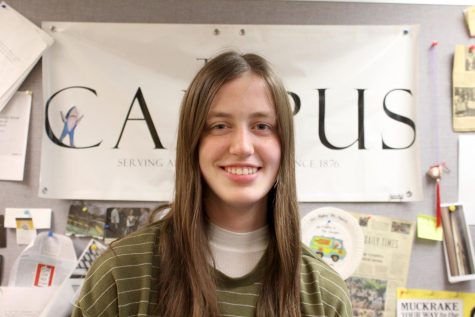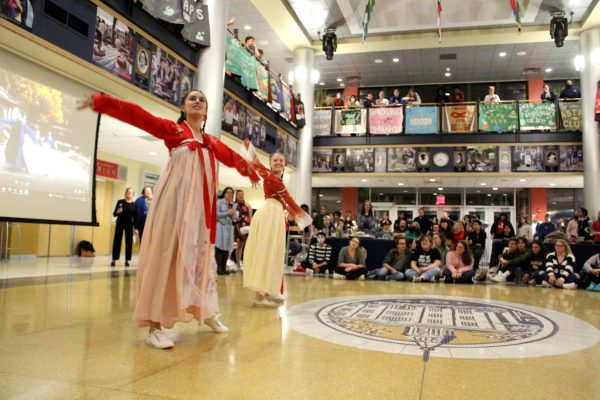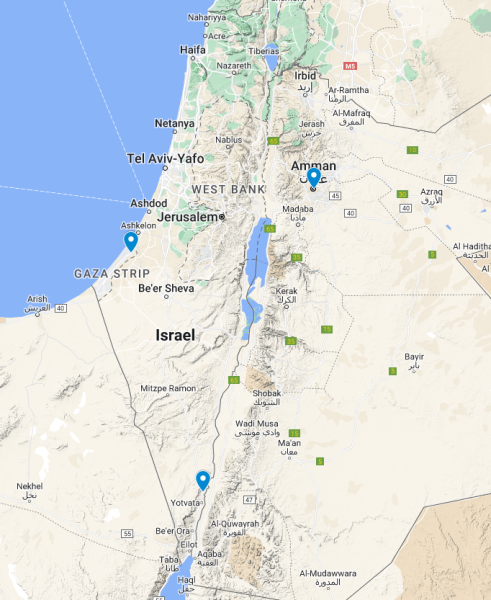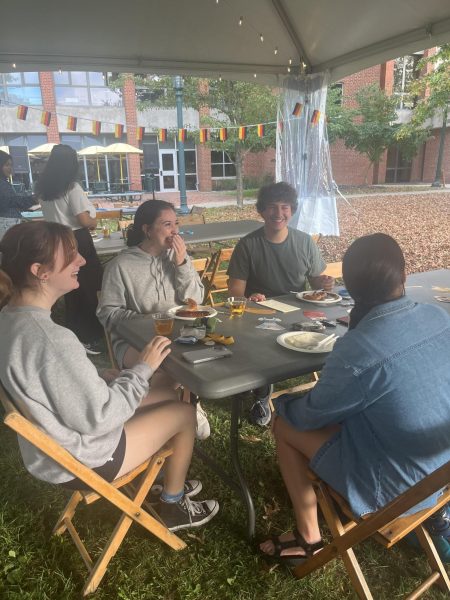Not only Christmas: Students celebrate winter holidays
The winter season is upon us. Michael Bublé is in the air, snow is on the ground and the smell of hot chocolate wafts outside of Grounds for Change. With winter break rapidly approaching, many students look forward to celebrating the holidays. Despite 93% of Americans celebrating Christmas, only about 45% of the world’s population celebrates the holiday, according to Journeyz. International students on campus shared how they celebrate the holidays back home. Take a trip around the globe in fewer than 80 days and learn about how the holidays are celebrated abroad.
The trip begins across the Atlantic Ocean. Lucia Jueguen, ’24, illustrated what winter celebrations look like in Spain. She described celebrating the holidays “for the whole three weeks of winter break.”
“We have a lot of things going on that are equally important,” Jueguen said. “In Spain (there is) Christmas, Christmas Eve, New Year’s Eve, New Year’s and then we celebrate the Three Wise Men in January.”
The Three Wise Men — also known as Three Kings Day — is a Catholic holiday which takes place from Jan. 5-6, celebrating the Three Wise Men who visited Jesus and gave him gifts, Jueguen explained.
“Essentially, it’s like Christmas, but instead of Santa it is (the) Three Wise Men,” Jueguen said. “There’s usually parades with people dressed up as the Three Wise Men and just going around town throwing sweets to the children. And then you would go to sleep and the next morning you wake up and you have presents under your tree from the Three Wise Men.”
Continuing across the European continent, Freya Lindqvist, ’25, described what winter festivities look like in Sweden. Lindqvist noted that Swedish celebrations are similar to those in the United States. According to Lindqvist, there are numerous winter celebrations, but the two largest are Christmas and La Lucia.
La Lucia — often referred to as St. Lucy’s Day by English-speakers — is a holiday in honor of St. Lucy and is celebrated on Dec. 13, Lindqvist explained. It is also known as a festival of lights, as people, typically young children, dress up as St. Lucy. They wear lighted crowns and hold flowers, and parade around schools, libraries and towns.
“(The parade leader) is dressed up with a crown with lights and in a white gown.” Lindqvist said. “Then the people behind her are dressed up as basically the same as the first Lucia except they don’t have the crown. They just have a little piece of lights in their hand and they sing walking around, whether it’s in a school or like an office. And so it’s like a little performance.”
In addition to St. Lucy’s Day, every Sunday before Christmas, people in Sweden light a candle. Then, on Dec. 24, they come together as families and celebrate Christmas. In Sweden, children open their presents the night of Christmas Eve, just after the fathers sneak out to personally deliver the presents as Santa, Lindqvist explained.
“So it’s usually the dad in the family or the grandpa in the family that says, ‘I’m coming back in a little bit,’” Lindqvist said. “Then he comes back and he knocks on the door dressed up as Santa with a little bag with presents. And then everyone centers around Santa and then he hands out the presents to all the children.”
Lindqvist added that in her neighborhood, all of the dads would take turns being the Santa for the whole block. One year, her Santa was a man she had never met before which made the whole experience more realistic.
“I just remember looking out the window and he was holding a lantern and like, big beard,” Lindqvist said. “He was walking towards the house and that was just very exciting as a seven-year-old.”
Trekking over to Asia, Riya Agrawal, ’23, explained how her grandparents celebrated the holidays back in India, a nation that predominantly practices Hinduism.
“We personally don’t celebrate Christmas being that that’s more of a Christian holiday,” Agrawal said. “Our festival Diwali, which is the ‘Festival of Lights,’ is considered our biggest holiday … So kind of like Christmas in the sense we are decorating but there’s lights everywhere, and that’s our New Year. ”
Diwali, Agrawal explained, is a very family-oriented holiday. On this day, which was Oct. 24 this year and will be Nov. 12 next year, families fill their houses with light and pray to a few important gods, including Rama and Lakshmi. Then they have a “huge feast” and end the day with sparklers and fireworks. Agrawal recalled one Diwali where she ate too much for dinner.
“My grandmother made my favorite dish, and it’s something that I hadn’t had in a while for some reason,” Agrawal said. “So I ate so much that I could barely move. I was adamant about doing fireworks so I went outside and was holding my stomach as I was doing the fireworks.”
After spending the day with her family that Diwali, Agrawal reflected back on the importance of family.
“That to me was like the ultimate closing,” Agrawal said. “It really reminded me of the importance of family and us being with each other. That was a great lesson to have, a great memory to have at such a young age. That stuck with me ever since.”
Crossing the border from India to China, Difei Chen, ’25, highlighted the importance of Chinese New Year in his culture.
“People usually have a very strict sense about doing Chinese New Year, especially the elders in China,” Chen said. “They’re going to tell you that the first day of the New Year’s Day is the most important day and it has to be perfect. If the year doesn’t start in a good way, then bad luck will keep coming for the whole year.”
Chen is a bit skeptical about the significance of following tradition on Chinese New Year. He said that the day can become rather cumbersome if one is to strictly adhere to the traditional rules of the day. Overall, though, he describes it as a holiday centered around reunions.
“The first day of New Year, we stay with our family and anticipate other people visiting us.” Chen said. “In China, we value the elders … (it is an) honor to pay a visit to them.”
For the next few days following the New Year’s, people visit their family and friends as a way of ushering in the New Year. For Chen though, and many students his age, the holiday is not so much a time for celebration.
“After I grew up, I would just be getting busy with studying,” Chen said.
Although some in China critique Christmas as being “western,” many others choose to celebrate the holiday, Chen explained, just not to the same degree that Americans do.
“People don’t usually care as long as you give them holidays,” Chen said. “Sometimes people just need a reason to have fun.”
Crossing back to the Western hemisphere, Hanan Hamed, ’25, described how the holidays are celebrated in the U.S. Virgin Islands. Hamed is a Muslim and does not celebrate Christmas. Back on the island, she recounts how there is a big tree on the center island that gets decorated and some people choose to decorate their yards.
“Since we don’t really celebrate Christmas, sometimes we get popcorn from the movie theater and just go around the island and see everyone’s deck,” Hamed said.
According to Hamed, in Islam the holidays do not correlate to certain seasons, but rather change in date every year in accordance with the lunar calendar. In addition to Islam; Judiasm, Hinduism and China use different lunar calendars for keeping track of their holidays. The differing calendars explains why the holidays for these cultures are celebrated on different days from year to year.
“I think it’s cool, ” Hamed said. “The only thing is that I wish that Muslims’ holidays would be treated like as Christian holidays or something, like if we had school off, because it kind of sucks.”
Hamed explained that last year, finals took place during Ramadan, a month of fasting in the Islamic faith. During Ramadan, eating and drinking, including water, is prohibited from sunrise to sunset, according to Britannica. This is meant to be a practice in the skill of self-restraint, one of Islam’s five pillars.
“It was just kind of rough,” Hamed said.
Finally, back in the United States, Kenna Marblestone, ’24, gives her perspective on celebrating the holidays in a dual-religion household.
“Celebrating Hanukkah and Christmas is pretty cool,” Marblestone said. “ I have to say it was a little weird, never seeing as much hype for Hanukkah as there was for Christmas.”
Similar to many other holidays, Hanukkah follows a lunar calendar and thus takes place on different days depending on the year, Marblestone explained. The celebration lasts eight days, as that was the number of days that the Macabees, an ancient Jewish family that was being persecuted by the Syrians, survived with one candle for light. To honor this, Marblestone said, families light one candle on the menorah every night of Hanukkah, using the center candle to ignite the wicks. After a candle is lit, it stays that way until it sputters out on its own.
Similar to Christmas, during Hanukkah people exchange gifts with each other.
“I got one gift for Hanukkah,” Marblestone said. “Because then we go to my mom’s side of the family (for Christmas) and get more gifts.”
For Jewish people that do not celebrate Christmas, Marblestone said, many go out to eat at Chinese restaurants.
“If you’re Jewish and it’s Christmas, it’s like a big thing to go and get Chinese food,” Marblestone said. “Because what restaurants are open? Chinese restaurants.”
Marblestone did critique American culture for focusing so much on Christmas during the winter season that other cultural holidays get swept under the rug.
“I think not just Hanukkah but every other major religious holiday like Kwanzaa (need recognition),” Marblestone said. “I feel like at some point, people want to see what they want to see. So all they see is Christmas stuff, but the moment that you change it up a little bit, you’re gonna help start something new.”

Caroline Maye is a first year from Chicago, Illinois. She plans to major in Political Science or History with a minor in Journalism in the Public Interest....






